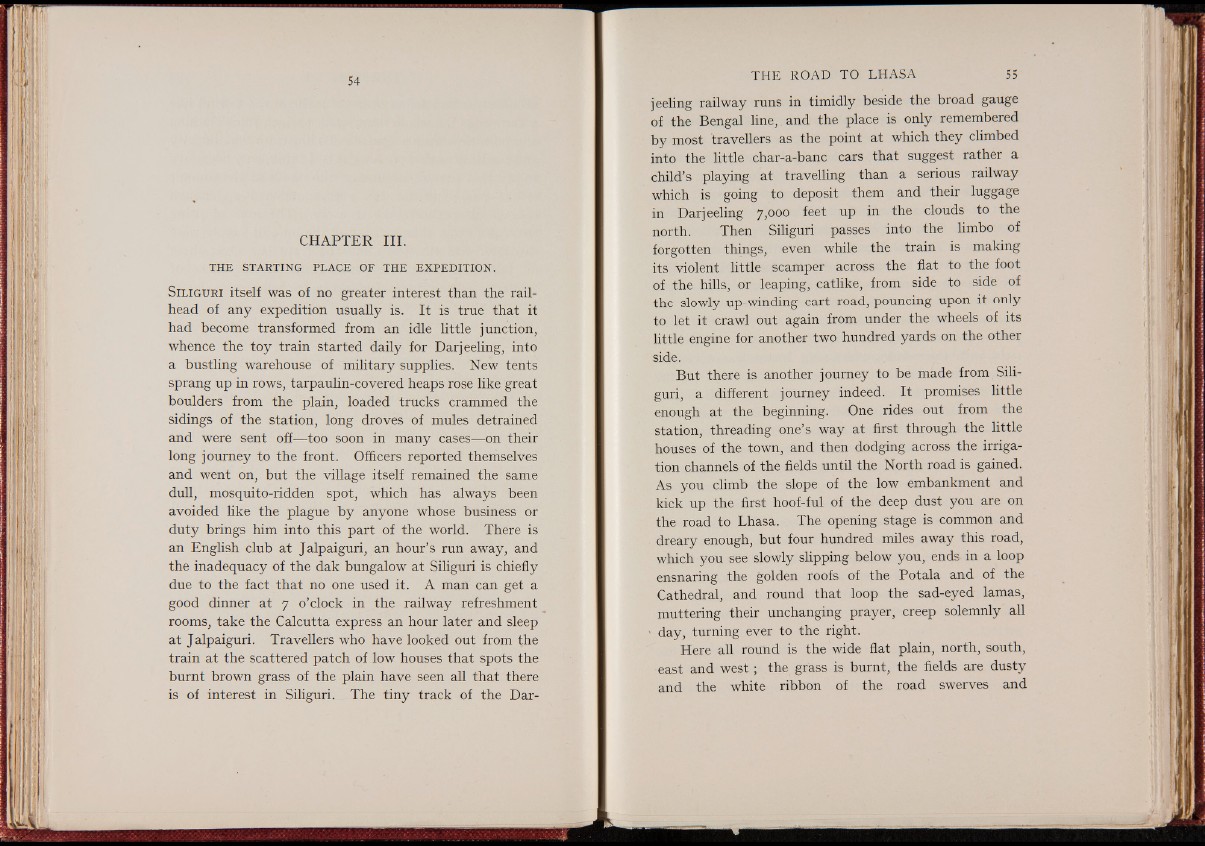
CHAPTER III.
THE STARTING PLACE OF THE EXPEDITION.
S i l ig u r i itself was of no greater interest than the railhead
of any expedition usually is. It is true that it
had become transformed from an idle little junction,
whence the toy train started daily for Darjeeling, into
a bustling warehouse of military supplies. New tents
sprang up in rows, tarpaulin-covered heaps rose like great
boulders from the plain, loaded trucks crammed the
sidings of the station, long droves of mules detrained
and were sent off-—too soon in many cases— on their
long journey to the front. Officers reported themselves
and went on, but the village itself remained the same
dull, mosquito-ridden spot, which has always been
avoided like the plague by anyone whose business or
duty brings him into this part of the world. There is
an English club at Jalpaiguri, an hour’s run away, and
the inadequacy of the dak bungalow at Siliguri is chiefly
due to the fact that no one used it. A man can get a
good dinner at 7 o’clock in the railway refreshment
rooms, take the Calcutta express an hour later and sleep
at Jalpaiguri. Travellers who have looked out from the
train at the scattered patch of low houses that spots the
burnt brown grass of the plain have seen all that there
is of interest in Siliguri. The tiny track of the DarTHE
ROAD TO LHASA 5 5
jeeling railway runs in timidly beside the broad gauge
of the Bengal line, and the place is only remembered
by most travellers as the point at which they climbed
into the little char-a-banc cars that suggest rather a
child’s playing at travelling than a serious railway
which is going to deposit them and their luggage
in Darjeeling 7,000 feet up in the clouds to the
north. Then Siliguri passes into the limbo of
forgotten things, even while the train is making
its violent little scamper across the flat to the foot
of the hills, or leaping, catlike, from side to side of
the slowly up-winding cart road, pouncing upon it only
to let it crawl out again from under the wheels of its
little engine for another two hundred yards on the other
side.
But there is another journey to be made from Siliguri,
a different journey indeed. It promises little
enough at the beginning. One rides out from the
station, threading one’s way at first through the little
houses of the town, and then dodging across the irrigation
channels of the fields until the North road is gained.
As you climb the slope of the low embankment and
kick up the first hoof-ful of the deep dust you are on
the road to Lhasa. The opening stage is common and
dreary enough, but four hundred miles away this road,
which you see slowly slipping below you, ends in a loop
ensnaring the golden roofs of the Potala and of the
Cathedral, and round that loop the sad-eyed lamas,
muttering their unchanging prayer, creep solemnly all
> day, turning ever to the right.
Here all round is the wide flat plain, north, south,
east and w e s t; the grass is burnt, the fields are dusty
and the white ribbon of the road swerves and